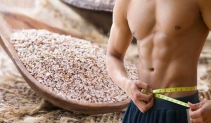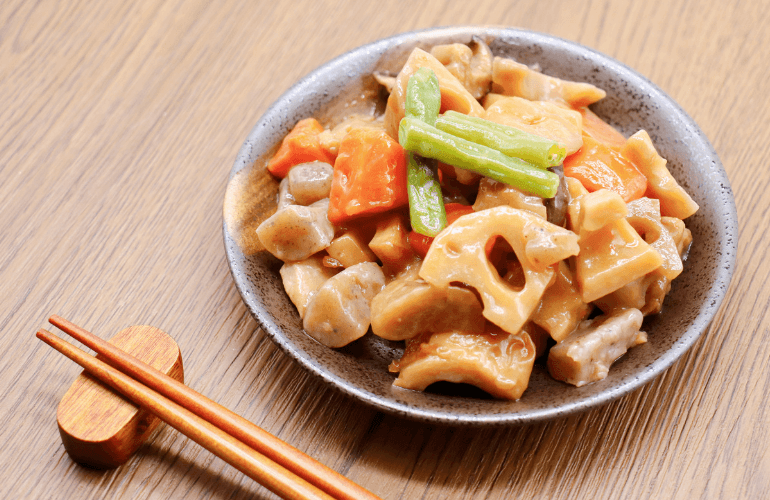
Glucomannan vs Psyllium for Weight Lose
When it comes to losing weight, different food supplements can help us achieve our goal and a balanced diet and daily exercise. Although we can buy different supplements in any health food store, there is currently one of them gaining more and more popularity among people who have put themselves on a diet. This article will point out glucomannan vs psyllium for weight lose. Although it is also known as Konjac or calorie-free paste, glucomannan consists of a dietary fiber cultivated in different Asian regions for many years.
But why is it used in weight-loss diets? What are its properties? If you want to know more about this food supplement, we recommend that you continue reading this OneHOWTO article, where we will explain what glucomannan is and what it is for.
What is Glucomannan, and What is it for?
As we already mentioned, for those wondering what konjac glucomannan is, it is a dietary fiber or water-soluble polysaccharide obtained from Konjac, also known scientifically as Amorphophallus Konjac K Konch, a perennial type plant belonging to the family of the Araceae. Glucomannan or Konjac has been cultivated for centuries in different Asian regions since it had. Still, it has two main uses in these areas: on the one hand, this dietary fiber is used as an ingredient for different cooking dishes, and on the other, It is also used as a compound for the preparation of remedies in Traditional Chinese Medicine or TCM.
However, what is glucomannan currently used for? As indicated, this water-soluble polysaccharide is used as a food supplement for diets where weight loss is sought, mainly consumed as a glucomannan paste and in capsules. It’s all because glucomannan facilitates the control of both the amounts of food and the calories we eat daily due to the properties that we will explain in the next section.
Also Read: Sudden Weight Loss causes & What are the Reasons
Properties of Glucomannan for Weight Loss
Although glucomannan was traditionally cultivated for use both as food and the preparation of medicinal remedies, it is currently used as a food supplement to promote weight loss. It has properties that allow us to control the intake of both food and daily calories. Among the properties of glucomannan to lose weight, we find:
Satiating Properties of Glucomannan
Konjac glucomannan is a water-soluble polysaccharide; it is a fiber with a high capacity to absorb water. This means that when we administer water to this substance, it swells until it creates a viscous gel that occupies up to 100 times more than its normal molecular weight. Thanks to this capacity, glucomannan has satiating properties that delay gastric emptying and prolong the feeling of fullness after meals. Here you can learn more about The best satiating foods.
Is Glucomannan a Laxative?
Another reason why glucomannan is used as a remedy for weight loss is that, being a fiber supplement, it facilitates bowel movements and prevents constipation. This digestive problem makes weight loss difficult. On the one hand, it has a prebiotic effect that favors the growth of healthy bacteria in the intestinal flora. And on the other hand, it has laxative properties that help stimulate the intestinal muscles. In this other article, we talk about the best natural glucomannan laxatives.
How to Take Glucomannan to Lose Weight?
If we are going to use this konjac glucomannan format, you must follow the following instructions:
Administer this supplement with plenty of water (between 2 and 3 glasses in each shot).
Take between 500 and 1500mg of this fiber half an hour before each meal.
If you use any medication, consume glucomannan at least 1 hour before taking the drugs.
Konjac Glucomannan also add in the Dukan Diet.
In addition to capsules, there are also other formats of glucomannan that are often sold in health food stores under the name of shirataki pasta or pasta without calories. In this case, you will only have to cook the glucomannan as if you were making traditional pasta and consume it. However, although some diets, such as the Dukan diet, defend this format of glucomannan, it is more recommended that before using this substance, you opt for whole-grain pasta since its only nutritional value is the 3% fiber contains, being the rest of its composition water.
Therefore, if we use it as our diet, we risk having nutritional problems since it is still a food supplement. This means that it can be used as a supplement on certain occasions. Still, it should not be taken as a regular substitute for other traditional kinds of pasta such as spaghetti or macaroni.

Contraindications and Side-Effects of Glucomannan
Although glucomannan can be beneficial when taken as a food supplement, it can also cause certain side effects, depending on how and how much it is taken, due to its fiber composition. Some of these are gas, bloating, or other intestinal problems. It is also not advisable to use it for a long time since Konjac can cause vitamin and other nutrient deficiencies as it interferes with its absorption.
In addition to its effects, this substance cannot be taken by everyone as it has the following contraindications :
Diabetes: Although glucomannan can lower blood sugar levels after eating, it is contraindicated for these people because it can influence the effects of their medication.
Digestive disorders: it is not recommended in cases such as dumping syndrome, Crohn’s disease, and inflammatory bowel disease, among others.
Children under 12 years of age: prolonged use can cause malnutrition.
This article is merely informative at one HOWTO; we do not have the power to prescribe any medical treatment or make any diagnosis. We invite you to go to a doctor in the event of presenting any condition or discomfort.
Health Benefits of Glucomannan Capsules
Glucomannan is utilized to shed weight due to its abundant soluble fibers. It offers numerous health benefits:
- It can increase feelings of satisfaction because this fiber slows the process of emptying gastric contents and intestinal transit, glucomannan capsules help in appetite suppressant. In addition, a few studies suggest that this effect may help in weight loss.
- Glucomannan Absorb fats; It also regulates the metabolism of fats, helping lower the free fatty acids and cholesterol levels in the blood. This is why the consumption of Glucomannan can reduce the risk of developing heart disease.
- It can also regulate the speed of intestinal transit, which can lead to a growth in stool volume and encourage the development of the intestinal microbiota because it is a prebiotic and helps fight constipation. Find out more about is a prebiotic and the purpose they’re used for.
- It can help control your blood sugar level and is beneficial in the management of diabetes.
- It may also create an anti-inflammatory effect inside the body. Consumption of Glucomannan may lower inflammation compounds, particularly in atopic allergic rhinitis and dermatitis; however, further research is required to prove this effect.
- It also increases minerals’ bioavailability and absorption capacities like calcium iron, magnesium, iron, and zinc.
- It can stop the development of colorectal cancer as it is high in soluble fibers, which act as a prebiotic that helps maintain the bacterial flora and protect the intestinal tract.
- In addition to this, it could also improve inflammatory bowel diseases, such as ulcerative colitis and Crohn’s disease, since the intake of this soluble fiber helps fight pathogenic microorganisms, stimulates the healing of the intestine, regulates the immune system, and improves the ability to generate a systemic immune response.
Also Read: Not only Extra Virgin: How to Choose the Right Olive Oil for Diet
How much Glucomannan Per Day for Weight Lose
To use Glucomannan, it is important to read the indications on the label since the amount to take varies according to the amount of fiber the product has. Normally, it is indicated to take from 500 mg to 2g per day, in two separate doses with two glasses of water in each dose, since water is essential for the action of the fibers.
The ideal time to take fiber is between 30 and 60 minutes before eating the main meal. The maximum dosage is 4 grams daily. Supplements for food must be monitored by a health expert such as a nutritionist or doctor.

Glucomannan vs Psyllium Husk
glucomannan vs Psyllium husk Shirataki NoodlesGlucomannan is a type of fiber taken from the roots of the Konjac plant, which is indigenous in Asia. The fiber absorbs water and forms a gel that can be used to reduce appetite. It’s been used as a traditional East Asian medicine for thousands of years. It is also a long history of use as an ingredient in the food.
Glucomannan absorbs water, like other soluble fibers, but appears to be the most absorbent and viscous option available. The best results are seen when three daily doses of 1 gram each are taken, approximately one hour before each meal.
It is the main ingredient in shirataki noodles, known as zero-calorie noodles. Because the fiber is indigestible, these noodles have almost no calories per serving.
Some brands may have more calories if mixed with rice flour or other ingredients to provide a better texture. But, they are amazing with noodles, etc. Suit strong flavors and hot sauces.
What is Psyllium Husk?
Psyllium is a fiber taken from the husk of the psyllium plant, called Plantago Ovata. Its brand name is Metamucil, but it is widely available as an off-brand supplement. It’s a soluble fiber, so it absorbs water and passes through your digestive system unchanged.

How much psyllium Per Day?
Dosages vary, and doses of up to 30 grams are generally well tolerated if enough water is drunk along with the supplement. A 5-gram dose appears to be a good starting point for the treatment of constipation; it can be adjusted higher or lower as needed.
Glucomannan vs Psyllium for Weight Lose
Glucomannan and psyllium bind with fats in the digestive system, essentially reducing a meal’s calorie count. Studies have also found that increasing fiber intake decreased fat and protein digestibility, again reducing the caloric value.
Does Psyllium Work the Same as Glucomannan?
Does Psyllium Work the Same as Glucomannan- appetite suppression, refusing good psyllium may have a small effect on a consumer’s appetite, but studies show it’s not enough to cause significant weight loss.
On the other hand, Glucomannan has much more clinical support to show that it does not suppress the consumer’s appetite.
In an eight-week study, obese consumers who took three 1-gram doses of Glucomannan each day (1 hour before each meal) lost 5.5 pounds. However, they were not following a calorie-restricted diet, and they were not taking any other weight loss measures!
Glucomanna Helps in Constipation
Both glucomannan and psyllium supplements appear to prevent and treat constipation effectively. Unlike other constipation treatments such as senna, they do not cause the intestine walls to spasm and, therefore, may be a more comfortable option. In addition, since they are both types of fiber, they absorb water, adding bulk to stool and moisture, allowing them to pass through your intestines easier. In Japan, Glucomannan has a nickname that translates to “the broom of the intestines” due to its effects on increasing stool size and preventing constipation.
Other Health Indicators
Because glucomannan and psyllium both bind with cholesterol and dietary fats, both can lead to low cholesterol, especially in people who have high cholesterol, to begin with. Psyllium can lower HDL cholesterol levels, however, which are good cholesterol. On the other hand, Glucomannan does not affect HDL cholesterol levels at all. In addition, glucomannan supplementation also appears to lower triglyceride levels.
For anyone who wants to take a fiber supplement but is concerned about increased flatulence, psyllium may be the best option. Unlike many other fibers, it does not ferment in the digestive system, so it does not cause “excessive flatulence.” Some studies even indicate that it can reduce gas.
Glucomannan also helps regulate blood sugar levels. Because it slows down digestion, including emptying the stomach after a meal, there is a more gradual rise in blood sugar levels than a sharp rise. This may mean reduced snacking, but it may also help treat prediabetes and could help prevent and treat hyperglycemia in diabetics. Diabetics and prediabetics should only take glucomannan supplements with the approval and supervision of their physician, as their medication may need to be altered as a result of taking this supplement.
Also read: Why are Pumpkin Seeds Good for Men?
Glucomannan Capsules Side Effects
Glucomannan Vs Psyllium – Glucomannan can cause some side effects, but most side effects seem to wear off after the first few days of use, as the body quickly gets used to higher fiber intake. Studies repeatedly report that most of the side effects of Glucomannan, primarily increased flatulence, stomach cramps, and bloating, stopped after the first three days of taking a glucomannan supplement, if they occurred at all.
Glucomannan can cause constipation if not enough water is drunk when taking the pill; at least one glass of water is recommended with the capsule, and then another glass of water is taken for the next half hour.
Increased bowel movements, both in size and frequency, are expected when increasing the amount of fiber in your diet, and starting a fiber-based appetite suppressant is no exception. However, there is a small risk of suffocation, as the product swells in contact with water. This is why the product comes in capsule form, not as a tablet. Obviously, like all supplements, the product must be kept out of the reach of children.
Glucomannan also affects blood sugar levels. People with diabetes should consult their doctor before taking any glucomannan-based product.
Psyllium can also potentially cause a variety of side effects. Stomach cramps and increased bowel movements are possible. It should be taken with plenty of water to avoid constipation. Serious allergic reactions, such as anaphylaxis, are a reported side effect of taking psyllium, although they are generally a rare occurrence. Possible signs of allergic reactions include vomiting, chest tightness, difficulty breathing, rashes, and hives. Stop taking the product, and if you have any of these symptoms, tell your doctor if they occur.
None of these supplements are suitable for people who have had intestinal blockages in the past unless approved by your doctor.
Unlike many other products with a laxative effect, there is no time restriction on how long you can supplement psyllium and Glucomannan. Other products like senna cause the intestines to contract, which pushes fecal matter through the intestines; Taking a product like senna for more than a week is not recommended, as it can cause dependency. This is not a problem with Glucomannan or psyllium, as they are fiber-based.
Glucomannan Vs Psyllium, what is better?
Glucomannan Vs Psyllium – psyllium depends on what your goals are. For example, psyllium is great for treating constipation, but Glucomannan also increases the volume and number of bowel movements.
When it comes to weight loss, Glucomannan stands out as the superior product, suppressing the consumer’s appetite, reducing the amount they eat, slowing digestion down (reducing snacking between meals), and ultimately helping weight loss. It is also useful as a tool to stave off hunger when following a low-calorie diet, helping you stick to your meal plan.
Disclaimer: Comments and investigations are based on an extensive investigation of information publicly available to consumers and us at the time of the entry’s first publication. The information is based on our personal opinion. While we strive to ensure that the information is up to date, manufacturers change their products from time to time, and future research may not agree with our findings. If you feel any of the information is inaccurate, don’t hesitate to contact us, and we will review the information provided.



